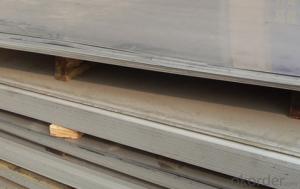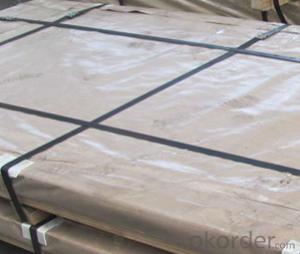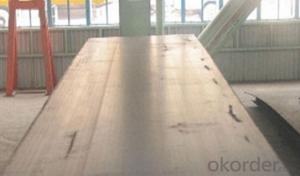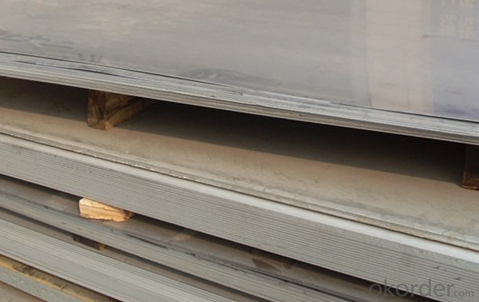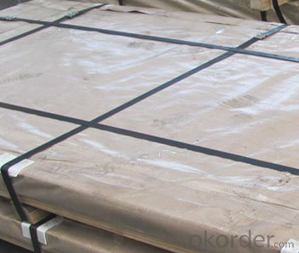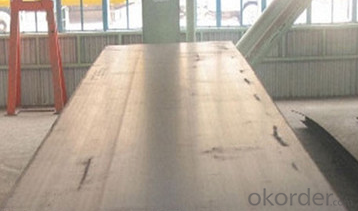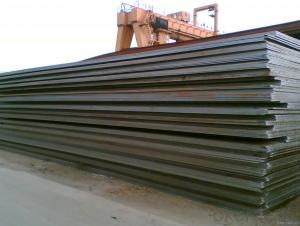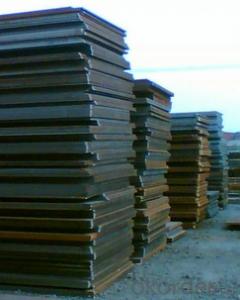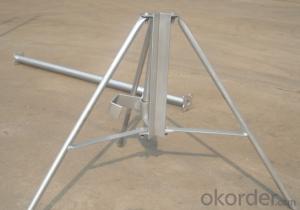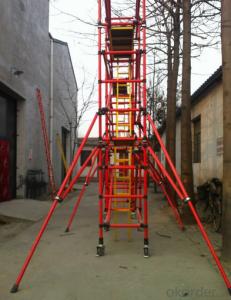Mild Carbon Steel Sheets Q235 CNBM
- Loading Port:
- Qingdao
- Payment Terms:
- TT OR LC
- Min Order Qty:
- 10 pc
- Supply Capability:
- 30 pc/month
OKorder Service Pledge
OKorder Financial Service
You Might Also Like
Quick Details
| Grade: | 300 Series | Standard: | JIS, AISI, ASTM, DIN, EN | Length: | 1000-6000 |
| Thickness: | 0.5-100mm | Width: | 1000-2000 | ) | |
| Brand Name: | putan | Model Number: | Q235.Q345 | Type: | Plate |
| Application: | Construction plate,boiler plate,container plate,shipbuilding plate,all | Certification: | BV | type: | plate |
Packaging & Delivery
| Packaging Details: | Export standard package,bundled or be required. The inner size of container is below: 20ft GP: 5.8m(length) x 2.13m(width) x 2.18m(high) 25tons about 24-26CBM 40ft GP: 11.8m(length) x 2.13m(width) x 2.18m(high) 25tons about 54CBM 40ft HG: 11.8m(length) x 2.13m(width) x 2.72m(high) 25tons about 68CBM |
| Delivery Detail: | 7-15 days after receiving the deposit |
Specifications
Q235 Carbon sheet
Original :China
thickness 0.5mm~100mm,
coil steel Processing.
MOQ : 25TON
Carbon Steel plate
Product | SS400 carbon steel plate price |
Standard |
GB/T700-2006,ASTMA283/A283M-03,ASTMA572/A572M,JISG3101-2004,SS400, JIS G3135-1986,SPEC590,EN10025/2-2004,S235JR or S235J2,E335 or S335JR…
|
Width | 500-2000mm |
WT | 0.5 –60mm |
length | 2000—6000mm |
Applications range |
Construction plate,boiler plate,container plate,shipbuilding plate,all kinds of industries and manufacturing structural applications.
|
MOQ | 25 ton / according to customers' requirement |
Quality | good attestation of honour choosed by customers SGS |
Supply capability | 5,000 ton / month |
Key to success | advanced technique and service and low price |
Authentification | ISO9001:2008 |
Market | North/South America, Europe, Asia,Africa,Mid East,ect. |
Packaging |
Standard seaworthy packing / according to the customers’requirement
|
Port | |
Delivery term |
T/T,L/C 30% deposit the balance before shipment,the balance paid by the copy of B/L OR L/C at sight
|
Delivery time | In 15 – 45 days after contract |
- Q: How do steel sheets compare to glass sheets?
- Steel sheets and glass sheets have distinct characteristics that make them suitable for different applications. Firstly, steel sheets are known for their strength and durability. They can withstand heavy loads and are highly resistant to impact and damage. This makes them ideal for construction purposes, such as in the manufacturing of buildings, bridges, and machinery. Additionally, steel sheets offer excellent protection against fire and extreme weather conditions. On the other hand, glass sheets are valued for their transparency and aesthetic appeal. They allow natural light to pass through, creating a bright and open atmosphere. Glass sheets are commonly used in windows, doors, and architectural structures to provide visibility and enhance the visual appeal of a space. Furthermore, glass sheets offer excellent thermal insulation properties, which can help reduce energy consumption in buildings. In terms of maintenance, steel sheets require minimal upkeep as they are resistant to corrosion and do not require regular cleaning. However, they may require painting or protective coatings to prevent rusting. On the contrary, glass sheets may need regular cleaning to maintain their transparency and appearance. They are also more prone to scratching and breakage compared to steel sheets. Lastly, cost is an important factor to consider. Steel sheets typically have a lower initial cost compared to glass sheets. However, the overall cost may vary depending on factors such as size, thickness, and quality. Additionally, the cost of installation and maintenance should also be taken into account. In conclusion, steel sheets and glass sheets have their own unique characteristics and properties. The choice between the two would depend on the specific requirements of the project, including strength, transparency, aesthetics, maintenance, and cost considerations.
- Q: What are the advantages of using steel sheets in construction?
- There are several advantages of using steel sheets in construction. Firstly, steel sheets offer excellent strength and durability, making them ideal for supporting heavy loads and withstanding extreme weather conditions. Additionally, steel sheets are highly resistant to fire, corrosion, and pests, ensuring the longevity of the structure. Furthermore, steel sheets are flexible and can be easily customized and fabricated to fit various architectural designs. Lastly, steel sheets are eco-friendly as they can be recycled, reducing waste and promoting sustainability in the construction industry.
- Q: How do steel sheets perform in high-pressure environments?
- Steel sheets are highly resilient and perform exceptionally well in high-pressure environments. Due to their inherent strength and durability, steel sheets can withstand and effectively contain the immense pressure exerted on them. This makes them a preferred choice in applications such as pressure vessels, pipelines, and industrial machinery. The high-pressure environment puts significant stress on materials, but steel sheets have the ability to resist deformation and maintain their structural integrity under these conditions. Their exceptional tensile strength and ability to withstand compressive forces without buckling or breaking make them a reliable choice for withstanding high pressure. Furthermore, steel sheets are known for their excellent corrosion resistance. This is particularly important in high-pressure environments since it helps prevent any potential leaks or failures due to corrosion-induced weakening. Steel sheets can be further enhanced with coatings or treatments to provide additional protection against corrosion, making them even more suitable for such demanding applications. Steel sheets also offer a high degree of versatility and can be easily fabricated into various shapes and sizes to meet specific requirements. This adaptability allows for the customization of steel sheets to suit different high-pressure environments, ensuring an optimal performance in a range of industrial settings. In summary, steel sheets are highly reliable and perform exceptionally well in high-pressure environments. Their strength, durability, resistance to deformation, and corrosion resistance make them a preferred choice for applications where containment of high-pressure substances is essential.
- Q: Are steel sheets resistant to rot or decay?
- No, steel sheets are not susceptible to rot or decay as they do not contain organic matter.
- Q: What are the different hardness levels available for steel sheets?
- The different hardness levels available for steel sheets range from soft to very hard, with common options being mild steel, hot-rolled steel, cold-rolled steel, and stainless steel. These hardness levels determine the steel's ability to resist deformation and wear, making it suitable for various applications based on the required strength and durability.
- Q: Are the steel sheets resistant to oil or grease?
- Yes, steel sheets are generally resistant to oil or grease. Steel is known for its durability and resistance to various chemicals, including oil and grease. The smooth surface of steel sheets makes it difficult for substances like oil or grease to adhere to them, allowing for easy cleaning and maintenance. Additionally, steel sheets can be further treated or coated with protective materials to enhance their resistance to oil or grease if required.
- Q: Are steel sheets suitable for food-grade applications?
- No, steel sheets are generally not suitable for food-grade applications as they can potentially leach harmful substances into the food.
- Q: Can steel sheets be used for solar panel mounting?
- Yes, steel sheets can be used for solar panel mounting. Steel is a strong and durable material that can provide a stable support structure for solar panels. It has the necessary strength to withstand the weight of the panels, as well as the external forces such as wind and snow loads. Additionally, steel sheets can be easily fabricated and customized to meet the specific requirements of the solar panel installation.
- Q: Should the carbon fiber reinforce the steel bar on the side of the beam?
- Not necessarily, mainly depends on how the design is calculated, usually put 100~200mm carbon fiber layering
- Q: Are steel sheets suitable for interior design applications?
- Yes, steel sheets are suitable for interior design applications. They offer a sleek and modern aesthetic, are durable and long-lasting, and can be customized to fit various design styles. Steel sheets can be used for wall cladding, ceilings, decorative panels, furniture, and other interior elements, adding a contemporary and industrial touch to any space.
Send your message to us
Mild Carbon Steel Sheets Q235 CNBM
- Loading Port:
- Qingdao
- Payment Terms:
- TT OR LC
- Min Order Qty:
- 10 pc
- Supply Capability:
- 30 pc/month
OKorder Service Pledge
OKorder Financial Service
Similar products
Hot products
Hot Searches
Related keywords
